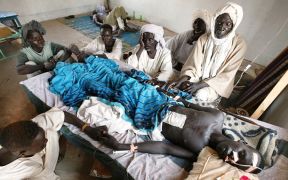Darfur death rate drops below crisis level – UN
KHARTOUM, June 28 (Reuters) – The number of people dying in Sudan’s war-torn Darfur region has dropped below crisis levels thanks to an influx of aid, but the lull could be short-lived if the fighting resumes, the United Nations said on Tuesday.

|
|
An internally displaced person in South Darfur is treated for a bullet wound to his chest after being shot by Janjaweed militia. His family members surround him in a hospital in South Darfur, October 2004. (HRW). |
Up to 10,000 people were dying every month last year in the vast, arid region where about 2 million people have fled their homes to camps during 2-1/2 years of revolt against the government in Khartoum.
The U.N. Humanitarian Coordinator for Sudan, Manuel Aranda Da Silva, said the aid effort had succeeded in containing the crisis, dubbed the world’s worst by U.N. officials last year.
A survey by the world body showed the rate of mortality in Darfur between November and May was 0.8 deaths per day per 10,000 people, three times lower than at the height of the crisis a year ago. An international crisis threshold recognised by the United Nations is 1 death per 10,000.
However, Da Silva said some aid was yet to appear and the situation could worsen quickly if foreign assistance dries up.
“Any interruption of the delivery of the humanitarian programme due to funding or change in security situation will have a dramatic impact and will provoke a relapse of the situation,” he warned.
The survey, which has yet to be fully released, found that injuries due to violent clashes were the cause of nearly a third of deaths in North Darfur. It also noted that the number of men aged between 15 and 35 in North Darfur had dropped sharply.
Mostly non-Arab Darfur rebels took up arms in early 2003 accusing the Khartoum government of neglect and of giving preferential treatment to Arab tribes in the region. Khartoum denies the charge.
Earlier this month the International Criminal Court opened a probe into alleged war crimes committed during the fighting, during which the United States says genocide was committed.
Government forces have largely stopped fighting rebels in recent months and bombardments have stopped since a shaky ceasefire was brokered, according to the African Union, but sporadic clashes continue.
